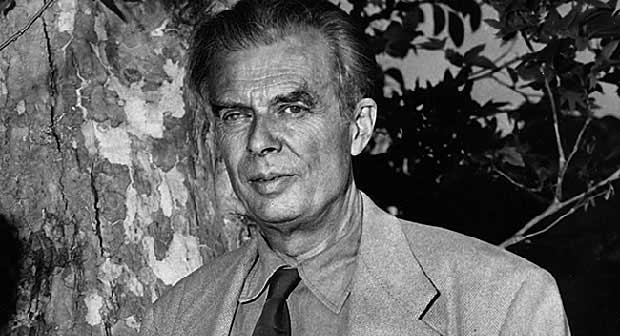Here the most important parts:
In politics, the central and fundamental problem is the problem of power. Who is to exercise power? And by what means, by what authority, with what purpose in view, and under what controls? Yes, under what controls? For, as history has made it abundantly clear, to possess power is ipso facto to be tempted to abuse it. In mere self-preservation we must create and maintain institutions that make it difficult for the powerful to be led into those temptations which, succumbed to, transform them into tyrants at home and imperialists abroad.
[...]
RAPID and accelerating population increase that will nullify the best efforts of underdeveloped societies to better their lot and will keep two-thirds of the human race in a condition of misery in anarchy or of misery under dictatorship, and the intensive preparations for a new kind of war that, if it breaks out, may bring irretrievable ruin to the one-third of the human race now living prosperously in highly industrialized societies - these are the two main threats to democracy now confronting us. Can these threats be eliminated? Or, if not eliminated, at least reduced?
My own view is that only by shifting our collective attention from the merely political to the basic biological aspects of the human situation can we hope to mitigate and shorten the time of troubles into which, it would seem, we are now moving. We cannot do without politics; but we can no longer afford to indulge in bad, unrealistic politics. To work for the survival of the species as a whole and for the actualization in the greatest possible number of individual men and women of their potentialities for good will, intelligence, and creativity - this, in the world of today, is good, realistic politics. To cultivate the religion of idolatrous nationalism, to subordinate the interests of the species and its individual members to the interests of a single national state and its ruling minority - in the context of the population explosion, missiles, and atomic warheads, this is bad and thoroughly unrealistic politics. Unfortunately, it is to bad and unrealistic politics that our rulers are now committed.
Ecology is the science of the mutual relations of organisms with their environment and with one another. Only when we get it into our collective head that the basic problem confronting twentieth-century man is an ecological problem will our politics improve and become realistic. How does the human race propose to survive and, if possible, improve the lot and the intrinsic quality of its individual members? Do we propose to live on this planet in symbiotic harmony with our environment? Or, preferring to be wantonly stupid, shall we choose to live like murderous and suicidal parasites that kill their host and so destroy themselves?
Committing that sin of overweening bumptiousness, which the Greeks called hubris, we behave as though we were not members of earth's ecological community, as though we were privileged and, in some sort, supernatural beings and could throw our weight around like gods. But in fact we are, among other things, animals - emergent parts of the natural order. If our politicians were realists, they would think rather less about missiles and the problem of landing a couple of astronauts on the moon, rather more about hunger and moral squalor and the problem of enabling three billion men, women, and children, who will soon be six billions, to lead a tolerably human existence without, in the process, ruining and befouling their planetary environment.
Animals have no souls; therefore, according to the most authoritative Christian theologians, they may become treated as though they were things. The truth, as we are now beginning to realize, is that even things ought no to be treated as mere things. They should be treated as though they were parts of a vast living organism. "Do as you would be done by." The Golden Rule applies to are dealings with nature no less than to our dealings with our fellow-men. If we hope to be well treated by nature we must stop talking about "mere things" and start treating our planet with intelligence and consideration.
[...]
For politics, nationalism, and dogmatic ideologies are luxuries that the human race can no longer afford. Nor, as a species, can we afford the luxury of ignore man's ecological situation. By shifting our attention from the now completely irrelevant and anachronistic politic of nationalism and military power to the problems of the human species and the still inchoate politics of human ecology we shall be killing two birds with one stone -reducing the threat of sudden destruction by scientific war and at the same time reducing the threat of more gradual biological disaster.
[...]
In a world where political problems are thought of and worked upon within a frame of reference whose coordinates are nationalism and military power, these ecology-oriented organizations are regarded as peripheral. If the problems of humanity could be thought about and acted upon within a frame of reference that has survival for the species, the well-being of individuals, and the actualization of man's desirable potentialities as its coordinates, these peripheral organizations would become central. The subordinate politics of survival, happiness, and personal fulfillment would take the place now occupied by the politics of power, ideology, nationalistic idolatry, and unrelieved misery.
